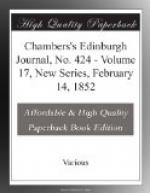There is scarcely anything more entertaining and instructive than a leisurely look over an old newspaper file. A newspaper of any age is an attraction, and the current newspaper something more, for it is now a necessity. But the next place to it in point of interest is perhaps due to the journal half a century, or two-thirds of a century old. It introduces us, if we be youthful, to the habits of our grandsires; and if we be in ‘the sere, the yellow leaf,’ to the habits of our fathers, more fully than the pleasantest novel or most elaborate essay, and far more intimately than the most correct and complete historical records. It enables us to observe freely the position and avocations of the denizens of the past, and catch hasty, but most suggestive glances at bygone days; it ’shews the very age and body of the time, its form and pressure.’ It is a milestone from which we may reckon our progress, and must delight as well as surprise us by the advancement it shews us to have made in social and political life, particularly with regard to those ‘triumphs of mind over matter,’ for which recent times have been pre-eminently distinguished.
The writer of this article had lately an opportunity of inspecting a file of the Newcastle Chronicle for 1765-6, and the contrast between journals and things in general which that examination forced on the attention, was in some respects sufficiently striking or curious to be, in his opinion, deserving of some permanent record. At present, the journal in question almost, if not entirely, reaches ’the largest size allowed by law;’ at that time, it consisted merely of a single demy sheet. Now, the Newcastle people would be amazed beyond measure if they did not receive at breakfast-time, on the morning of publication, the parliamentary, and all other important news of the night; then, the latest London news was four days old. But a better idea of the journal can perhaps be given, by stating what it lacked than what it then contained. It had no leaders, no parliamentary reports, and very little indeed, in any shape, that could be termed political news. In these matters, its conductor had to say, with Canning’s knife-grinder: ’Story! God bless you, I have none to tell, sir.’ Not that the political world was unfruitful in affairs of moment; it was a time of no small change, interest, and excitement. In the period referred to, the Grenville ministry had endeavoured to burden the American colonies, by means of the stamp-duties, with some of the debt contracted in the late war. Thereupon, immense discontent had arisen at home and abroad; that administration had fallen; and the Rockingham ministry, which was then formed, found full employment (in 1766) in undoing what had been effected in the previous year. How the Grafton ministry was next formed; how the unfortunate design of taxing the colonists was revived; and how that policy ended, readers of English history know full well. John Wilkes, too, had been already




